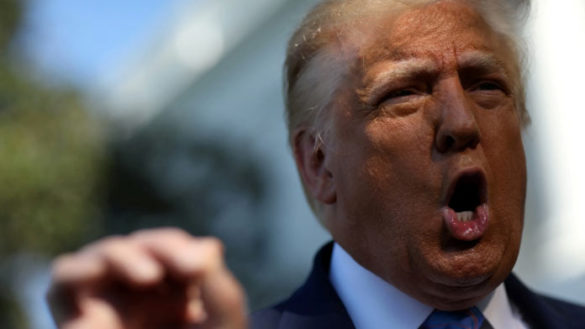
Trump sharpens anti-China line for battle with Biden
WASHINGTON — With an election looming in November, U.S. President Donald Trump has intensified his administration’s offensive against China through both rhetoric and action as he combats presumptive Democratic rival Joe Biden.
Trump ratcheted up the pressure this month in quick succession. He signed an executive order last week that would ban U.S. transactions with ByteDance, the Chinese owner of TikTok, within 45 days — a measure to force the company to divest the popular app. Washington levied sanctions Friday against senior Chinese officials accused of involvement in Beijing’s crackdown in Hong Kong, including Carrie Lam, the territory’s chief executive.
The next move could be fresh tariffs on Chinese goods, on the grounds that Beijing has failed to meet its obligations under the “phase one” trade deal reached in January. Such action might burnish Trump’s image as a China hawk ahead of the presidential election, but would reignite the trade war.
Beijing agreed to boost purchases of American products and services by $200 billion from 2017 levels over 2020 and 2021, while raising goods imports by at least $63.9 billion this year alone.
But U.S. exports to China in the first half of 2020 dipped 4% on the year instead, amid the coronavirus outbreak. That puts the total at just 46% of the June year-to-date target, the Peterson Institute for International Economics said.
Mid-August will mark six months since the pact took effect. The two sides agreed to hold twice-yearly cabinet-level reviews of the deal. U.S. Trade Representative Robert Lighthizer and Chinese Vice Premier Liu He are reportedly set to meet by videoconference this week.
Trump, who has expressed impatience with the lack of progress, could declare China to be breaking its promises and impose punitive tariffs.
Certain steps against China offer the Republican president an opportunity to set up a contrast with Biden.
Washington is poised to impose tougher auditing requirements on Chinese companies listed in the U.S., ending special treatment that Michael Pillsbury, director for Chinese strategy at the Washington-based Hudson Institute, says Biden was responsible for in the first place.
Companies listed on U.S. markets usually are subject to periodic audits by American authorities, but Beijing has resisted providing necessary records from Chinese auditing firms. The Trump administration looks to revoke a 2013 agreement that essentially exempted Chinese auditors from disclosure requirements.
The memorandum of understanding between the U.S. Public Company Accounting Oversight Board and Chinese authorities was intended to improve access to financial information. But it lets Chinese companies refuse requests if complying would violate domestic law.
Among those responsible for this arrangement was Biden, who was vice president at the time. Biden held meetings with then-Chinese Vice President Xi Jinping from 2011 on, urging more Chinese investment in the U.S.
Trump, now running consistently behind Biden in the polls, sees painting his rival as soft on Beijing as a way to regain some ground. The president has repeated a disputed claim that Biden’s son Hunter won a $1.5 billion investment deal from a Bank of China subsidiary after a 2013 diplomatic visit there.